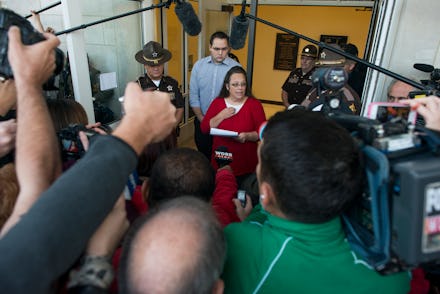Kim Davis Is Back on the Job in Kentucky, But the Legal Fight Is Far From Over

Nearly a week after being released from jail, Kentucky clerk Kim Davis returned to work on Monday, promising to neither authorize nor interfere with the issuance of marriage certificates to same sex couples in Rowan County.
Davis' return was greeted by large crowds, cameras and confusion over the next stages in this legal battle as Davis delivered prepared remarks for the press before entering the building.
Bemoaning her situation, Davis laid out the challenge she faced upon returning to her elected office. "I'm here before you this morning with a seemingly impossible choice that I do not wish on any of my fellow Americans: my conscience or my freedom," Davis said, choking back tears. "My conscience or my ability to serve the people that I love."
Davis was released from jail last week by U.S. District Court Judge David Bunning under the condition that she not interfere with the issuance of marriage licenses to any legally eligible couples, including same-sex couples.
Whether Davis honors that order wasn't immediately clear Monday morning. In her statement, Davis raised more questions than answers when discussing the way ahead for her and her office.
Regarding the issuance of marriage licenses, Davis declared that "effective immediately, and until an accommodation is provided, by those with the authority to provide it, any marriage license issued by my office will not be issued or authorized by me."
Her proposed alternative? That her deputies continue issuing certificates in her stead.
"If any of [my deputies] feel that they must issue an unauthorized license to avoid being thrown in jail, I understand their tough choice, and I will take no action against them," she said. "However, any unauthorized license they issue will not have my name, my title or my authority on it. Instead, the license will state that they are issued pursuant to a federal court order."
The issue: The problem with that approach is that it's unclear whether such certificates are legally sufficient. Kentucky law requires that the county clerk issue marriage certificates for their respective county. For their part, Davis' lawyers have called certificates issued without her signature "void." Even Judge Bunning questioned their validity.
On the other hand, Kentucky law regarding civil procedure is far clearer on situations like this, stating that "any duty enjoined by law or by the Rules of Civil Procedure upon a ministerial officer, and any act permitted to be done by him, may be performed by his lawful deputy."
Reading Kentucky's rules of civil procedure as validating marriage certificates issued by Davis' deputies mirrors the reasoning used by the Sixth Circuit U.S. Court of Appeals when they dismissed Davis' argument that her faith should exempt her from following decided law. Writing in August, the Sixth Circuit concluded that "it cannot be defensibly argued that the holder of the Rowan County Clerk's office, apart from who personally occupies that office, may decline to act in conformity with the United States Constitution as interpreted by a dispositive holding of the United States Supreme Court."
This tracks closely with the standard historically used in regard to Supreme Court decisions. Specifically, the Commonwealth of Kentucky doesn't need to proactively pass a new law legalizing same-sex marriage because the Supreme Court's declaration that laws prohibiting same-sex marriage are unconstitutional made clear that allowing same-sex couples to secure marriage certificates was the only constitutional option available to any government body.
The continued confusion over Rowan County's marriage certificates underscores the importance of holding public officials accountable to the rule of law. There is no question that same-sex couples are legally entitled to receive marriage certificates in Rowan County, Kentucky, and anywhere else in the U.S. The only questions now are whether Davis' personal beliefs will be allowed to trump the constitutional rights of these same-sex couples and whether, and for how long, Davis is willing to go back to jail in defense of her beliefs.